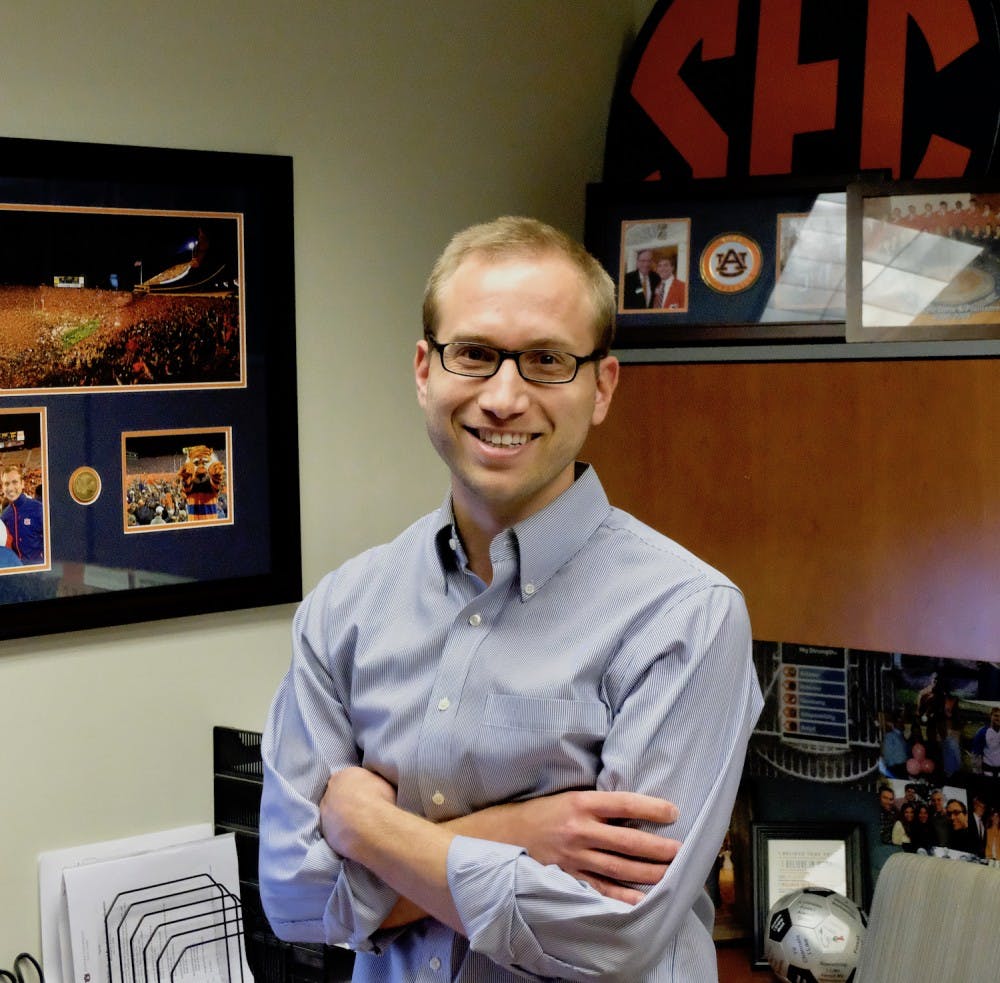If someone had told a young Brad Smith that he would spend not just his academic career, but his professional career in Auburn, he would’ve thought they were crazy.
“I was always the kid that wanted to be different than the rest of my Birmingham peers and go somewhere other than Auburn or Alabama,” Smith said.
Vanderbilt was his number one choice for schools, but the decision came down to spending $40,000 a year or taking advantage of a hefty scholarship.
“I decided to come to Auburn, and I was actually really bitter about it for the first couple weeks I was here because my heart had been set on going to Vanderbilt,” Smith said.
But that sentiment didn’t last long.
“I walked into my first football game and fell in love pretty quickly.”
Smith’s resentment for Auburn took a sharp turn and became a passion for the place he now calls home.
Nearly 10 years later, Smith tries to have what he calls an “exponential eternal effect” on the students he interacts with as SGA adviser. This mentality recently led him to receiving the advisor of the year award at the annual conference of all SEC student government associations.
“I went from being the kid bitter about being in Auburn and refusing to say 'War Eagle' at Camp War Eagle to being the person working here years and years later and loving it,” Smith said.
Smith’s time as a student became synonymous with student involvement. During his time as a a stuent his long list of involvement included member of Farmhouse, project coordinator for Impact, assistant director for Big Event, president of Cardinal Key Honors Society, vice president of ODK and senior adviser to the president of SGA.
Although his involvement was rewarding, it also caused him to question whether he actually wanted to end up going to medical school, which had always been the plan.
“My desire to be a doctor revolved more around pride than it did passion,” Smith said. “I realized what I loved about being a doctor was the taking care of and developing of people and that there were a lot of other opportunities to do that.”
Reconsidering his vocational goals, after graduation, Smith took advantage of an opportunity with Teach for America, an organization that places graduates in public-school systems for a minimum of two years. He was assigned to teach math to seventh graders in Denver, Colorado, in a school that was 85 percent Mexican-American.
“That was a really neat opportunity for me to live and work somewhere very different than my hometown and alma mater,” Smith said.
Smith said Teach for America sometimes receives criticism because it is an appealing option for students who are just trying to find a buffer between graduation and the job they eventually want to end up in. Smith said he did go into the job with some of that selfish perspective, but it was quickly absolved.
“All of a sudden, you have 30 seventh graders sitting in desks in front of you, and you can’t help but lose any selfish motives that you have because you have 30 kids in front of you that need you there for them,” Smith said.
Smith found his time at the middle school rewarding and meaningful, and he decided to stay an extra year. It also affirmed his desire to develop young people through education.
But, he also had an itch to go to graduate school, and he realized he always would if he didn’t pursue it. He came back to Auburn to pursue a master’s degree in higher education administration while also serving as graduate assistant to SGA.
“It’s a fun environment to be in because it allows you to really just champion the projects that the students are interested in and to see them develop over the course of the year,” Smith said.
After earning his master’s, Smith applied for and became the full-time SGA adviser and spent nearly five years in the position before being named assistant director for student involvement. In his new position, Smith will work closely with SGA as well as UPC.
“It’s not necessarily my job to make decisions for what the student body wants,” Smith said. “I help equip our SGA student leaders to do that effectively.”
Smith’s time as SGA adviser culminated with the award for adviser of the year, which was the first time the award was given at the conferences.
“It’s the result of many years of other staff pouring into me and getting to work with some really incredible students,” Smith said. “The credit goes to a lot of different people.”
With so much turnover each year in SGA, Smith said a key to maintaining success is guidance from one SGA to the next during the transition, especially because many projects and initiatives take many years to achieve.
“Over time, I track their development as individuals, rather than just looking at whether we’ve completed this or that project,” Smith said. “What’s important to me is that they’re able to identify what are the things they want to develop about themselves and their leadership.”
“It’s extremely rewarding to get to see them finish their term and look at more than just what are the platform points that they achieved,” he added.
Including his time as a middle school math teacher, Smith has spent over a decade doing what he loves and sees as his life purpose.
“If I’m able to develop the students who come through the office of student involvement here at Auburn to go out and serve communities like the one I got to serve while in Denver, then I’m having an exponential eternal effect," Smith said. "And that is what is incredibly meaningful to me.”
Do you like this story? The Plainsman doesn't accept money from tuition or student fees, and we don't charge a subscription fee. But you can donate to support The Plainsman.





